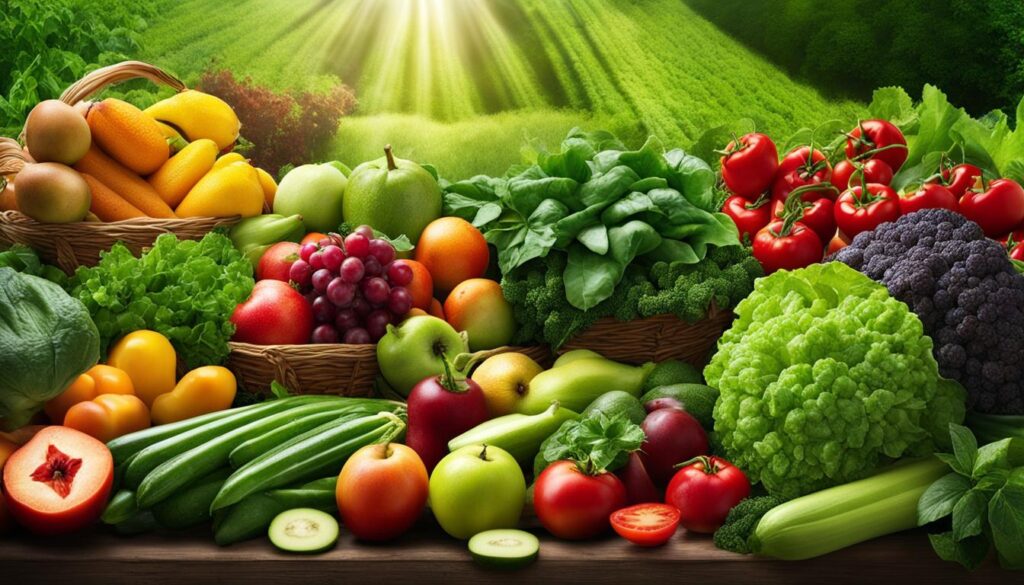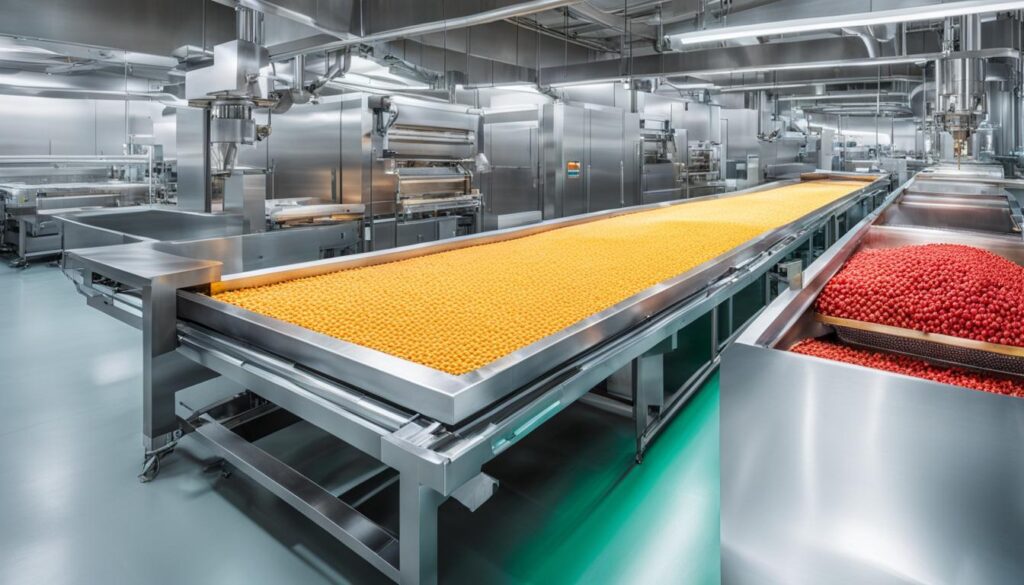What Is Food Science : Food science is a fascinating and multidisciplinary field that delves into the study, research, and application of scientific principles to the production, processing, and distribution of food. It encompasses a wide range of disciplines, including chemistry, biology, microbiology, nutrition, and engineering.
In simple terms, food science is all about understanding the chemical makeup of food, developing new food products, ensuring food safety, and improving the overall quality and nutritional value of food. It plays a critical role in the food industry, working behind the scenes to keep our food safe, nutritious, and readily available.
From exploring the chemistry of food components to developing innovative production techniques, food scientists are at the forefront of ensuring that the food we consume meets the highest standards of quality, safety, and nutritional value.
Key Takeaways:
- Food science is a multidisciplinary field that applies scientific principles to the production, processing, and distribution of food.
- It involves understanding the chemical makeup of food, developing new food products, ensuring food safety, and improving overall quality and nutrition.
- Food scientists play a crucial role in the food industry, working in areas such as production, quality control, product development, and research.
- Food science is essential for ensuring a safe and nutritious food supply, as well as advancing technological innovations in food production.
- By embracing the principles of food science, we can enhance the quality of our food and promote the health and well-being of individuals and communities.
The Role of Food Scientists in Nutrition and Health
Food scientists play a vital role in nutrition and health, employing scientific principles to study the composition of food and its impact on the body. By understanding the science behind food, they develop nutritious and balanced food products that contribute to overall well-being. Additionally, food scientists are responsible for ensuring food safety, implementing quality control measures, and conducting microbiological testing to prevent contamination and illness.
The study of food is a multidisciplinary field that combines biology, chemistry, and nutrition. Food scientists analyze the chemical composition of food, studying how different nutrients and ingredients interact with the body’s systems. This knowledge helps them create food products that meet dietary guidelines, promote good health, and address specific nutritional needs.
The Importance of Food Safety
“Food safety is a top priority for food scientists. Through rigorous testing and quality control measures, we work to protect consumers from potential hazards and ensure that the food supply remains safe and wholesome.”
Food scientists also play a crucial role in ensuring food safety. They work diligently to prevent foodborne illnesses by implementing strict quality control measures and conducting thorough inspections throughout the production and distribution process. By adhering to governmental regulations and industry standards, food scientists help to maintain the overall safety and integrity of the food supply.
In conclusion, food scientists are essential in promoting nutrition and health through their understanding of the scientific principles that govern food. By developing nutritious and safe food products, they contribute to the well-being of individuals and communities. Their work in food safety is crucial in preventing foodborne illnesses and protecting the public. Through their expertise and dedication, food scientists continue to advance our understanding of nutrition and improve the quality and safety of the food we consume.
| Role of Food Scientists | Responsibilities |
|---|---|
| Studying the composition of food | Understanding how different nutrients and ingredients affect the body |
| Developing nutritious and balanced food products | Meeting dietary guidelines and promoting good health |
| Ensuring food safety | Implementing quality control measures and conducting microbiological testing |
| Preventing contamination and illness | By adhering to strict regulations and industry standards |
The Science Behind Food Production and Technology
Food production and technology are integral parts of the food industry, driven by scientific principles and advancements. Food scientists leverage their expertise to develop efficient methods of producing, processing, and packaging food. By combining scientific knowledge with innovative technologies, they aim to improve the overall efficiency and sustainability of food production. The application of scientific principles in the food industry enables increased availability and affordability of food, meeting the demands of consumers.
Food scientists play a crucial role in the development of new food manufacturing processes and technologies. These advancements cater to changing consumer preferences and demands for convenient, nutritious, and sustainable food options. By staying at the forefront of scientific research and technological advancements, food scientists contribute to the continuous improvement and innovation within the food industry.
To illustrate the impact of food technology and production, consider the following table:
| Factor | Traditional Food Production | Modern Food Production |
|---|---|---|
| Efficiency | Manual labor and slower processes | Automated systems and streamlined processes |
| Sustainability | Higher use of resources and potential waste | Reduced resource consumption and waste through optimized processes |
| Food Safety | Risk of contamination and foodborne illnesses | Stringent quality control measures and safe processing techniques |
| Product Variety | Limited options and slower innovation | Diverse range of innovative food products and flavors |
Through the integration of scientific principles and technological advancements, food production has evolved to meet the demands of a rapidly changing world.
The Intersection of Food Science and Research

Research plays a critical role in the field of food science, driving innovation and improving our understanding of the complex world of food. Food science research involves the systematic investigation of various aspects of food production, processing, and consumption. Through scientific inquiry and experimentation, food scientists aim to expand our scientific knowledge, address emerging challenges, and develop new and improved food products and technologies.
One area of food science research focuses on food safety, with scientists working to identify and mitigate potential hazards and contaminants that may affect the quality and safety of our food. By conducting rigorous testing and analysis, researchers can ensure that our food supply is free from harmful substances and meets industry and regulatory standards. Additionally, research in food science explores ways to enhance the nutritional value of food, develop sustainable production methods, and address issues related to food waste and environmental impact.
The food science industry heavily relies on research and development to drive innovation and remain competitive. Companies invest in research to improve their existing products, develop new food formulations, and explore novel processing techniques. This research not only helps companies meet consumer demands but also contributes to the overall advancement of the food industry. Research findings inform the development of food technologies, packaging solutions, and quality control measures, ensuring that the food we consume is safe, nutritious, and of high quality.
The Role of Scientific Knowledge in Food Science Research
Scientific knowledge forms the foundation of food science research. Researchers draw upon disciplines such as chemistry, biology, microbiology, and nutrition to gain insights into the various aspects of food. By applying scientific principles and methods, they can uncover new information, validate existing theories, and discover innovative solutions to complex challenges in food production and safety.
“Research is the gateway to innovation in the food science industry. It allows us to tap into the vast potential of scientific knowledge and apply it to create better, safer, and more sustainable food products,” says Dr. Jane Reynolds, a leading food science researcher.
Food science research also involves collaboration between academia, industry, and government agencies. By sharing knowledge and resources, researchers can leverage their expertise and work together to address pressing issues and drive advancements in the field. This collaborative approach ensures that research findings are translated into practical applications, benefiting both the food industry and consumers.
| Key Areas of Food Science Research | Description |
|---|---|
| Food Safety | Investigating methods to prevent microbial contamination and ensure the safety of our food. |
| Nutrition and Health | Studying the impact of food on human health and exploring ways to develop nutritious and functional food products. |
| Flavor Chemistry | Understanding the chemical composition and sensory attributes of food to enhance the overall flavor experience. |
| Product Development | Creating new food products or improving existing ones by utilizing scientific knowledge and consumer insights. |
| Sustainability | Developing environmentally-friendly practices and technologies to minimize the ecological footprint of the food industry. |
Education and Career Opportunities in Food Science

For individuals interested in pursuing a career in food science, there are various educational pathways and career opportunities available. A solid foundation in food science can be obtained through undergraduate and graduate programs offered by many universities.
Food science courses typically cover a range of subjects, including microbiology, biochemistry, food chemistry, food engineering, and food safety. These courses provide students with the necessary knowledge and skills to understand the scientific principles behind food production, processing, and quality control.
Upon completion of a food science degree program, graduates can explore diverse career opportunities in the food industry. They can work in areas such as food manufacturing, research and development, quality control, regulatory agencies, and academia. From developing new food products to ensuring food safety and quality, food scientists play a crucial role in the food industry.
Benefits of a Food Science Degree
Obtaining a food science degree opens up a world of possibilities for aspiring food scientists. Here are some key benefits of pursuing a food science education:
- Industry expertise: A food science degree equips students with in-depth knowledge of food composition, processing techniques, and quality control measures. This expertise is highly valued by employers in the food industry.
- Job opportunities: The food industry is vast and continuously growing. With a food science degree, graduates can choose from a wide range of career paths, from research and development to quality assurance.
- Impactful work: Food scientists have the opportunity to make a significant impact on improving the safety, quality, and nutritional value of food. Their work directly contributes to the well-being of individuals and communities.
- Ongoing learning and innovation: The field of food science is constantly evolving, with new research and technologies emerging. Pursuing a food science degree allows individuals to stay up to date with the latest advancements and contribute to ongoing innovation.
A food science degree provides a strong foundation for a fulfilling and rewarding career in the food industry. Whether you aspire to become a food scientist, quality control specialist, or research and development expert, a food science education will equip you with the necessary knowledge and skills to succeed.
The Impact of Food Science on the Food Supply

Food engineering and agricultural and food science play a crucial role in ensuring a sustainable and abundant food supply. By combining scientific knowledge with innovative technologies, food scientists work towards optimizing food production, minimizing waste, and ensuring food security for a growing population.
One aspect of food science that contributes to the food supply is food engineering. Food engineers develop and implement advanced technologies and processes to maximize efficiency in food production, processing, and packaging. These technologies help to minimize losses during harvesting, transportation, and storage, thereby reducing food waste and increasing the availability of food for consumers.
In addition to optimizing production methods, food scientists also focus on developing sustainable food systems. They work towards minimizing the environmental impact of agriculture and food production by promoting practices that conserve resources, reduce greenhouse gas emissions, and support biodiversity. By adopting sustainable food production practices, food scientists contribute to the long-term viability of our food supply and the health of our planet.
| Impact of Food Science on the Food Supply | Benefits |
|---|---|
| Optimized Food Production | Increased efficiency, reduced waste |
| Sustainable Food Systems | Environmental conservation, resource efficiency |
| Improved Food Security | Increased availability, reduced losses |
In summary, food engineering and agricultural and food science are essential for ensuring a sustainable and resilient food supply. Through the application of scientific principles and innovative technologies, food scientists contribute to optimizing production methods, developing sustainable food systems, and improving food security. By embracing the principles of food science, we can work towards a future where food production is efficient, environmentally friendly, and able to meet the needs of a growing global population.
How Food Science Improves Food Safety and Quality

Food science plays a vital role in ensuring food safety and quality. Food scientists and technologists utilize their knowledge of food chemistry and microbiology to develop safe and nutritious food products. They work on various aspects of food production, including product development, quality control, and sensory analysis, to ensure that food meets industry and government specifications and regulations.
One of the key areas where food science contributes is in product development. Food scientists use their expertise to create new food products that are not only delicious but also safe and nutritious. They carefully formulate the ingredients, ensuring that they are properly balanced and meet consumer demands for taste, texture, and nutritional value. Through rigorous testing and analysis, food scientists can identify potential hazards and allergens, ensuring that the final product is safe for consumption by individuals with specific dietary restrictions or sensitivities.
“Food scientists work tirelessly to ensure that the food we consume is of high quality and free from harmful contaminants. By employing strict quality control measures, conducting regular inspections, and implementing standardized testing protocols, they help maintain the safety and integrity of our food supply.”
In addition to product development, food scientists also play a crucial role in quality control. They establish and enforce quality standards throughout the food production process, from sourcing ingredients to packaging and distribution. By conducting thorough inspections and audits, food scientists help identify any potential issues or deviations from standards and implement corrective actions to maintain the safety and quality of the final product.
The field of food science is dedicated to ensuring that the food we consume is not only safe but also of high quality. Through their expertise in food chemistry, microbiology, and product development, food scientists contribute to the continuous improvement of the food supply, enhancing the overall safety and enjoyment of our meals.
| Benefits of Food Science in Food Safety and Quality: |
|---|
| 1. Development of safe and nutritious food products |
| 2. Implementation of quality control measures and inspections |
| 3. Identification and mitigation of potential hazards and allergens |
| 4. Establishment and enforcement of quality standards |
The Future of Food Science and Technology

The field of food science is constantly evolving, driven by advancements in technology and changing consumer demands. As we look towards the future, there are several key areas where food science and technology are expected to make significant contributions.
Sensory Science and Food Research:
Sensory science plays a crucial role in understanding and enhancing the sensory experience of food. Researchers are exploring new techniques and technologies to measure and analyze the taste, texture, aroma, and appearance of food. By understanding consumer preferences and perceptions, food scientists can develop products that cater to individual tastes and preferences.
Additionally, food research is focused on harnessing technological advancements to develop innovative food products. Scientists are exploring the potential of ingredients such as plant-based proteins, alternative sweeteners, and functional foods that offer specific health benefits. These advancements in food research will shape the future of the industry, providing consumers with new and exciting options that align with their dietary needs and preferences.
Technological Advancements in Food Processing:
Technological advancements are driving improvements in food processing techniques and equipment. Automation and artificial intelligence are being integrated into food production lines, improving efficiency and consistency. Advanced packaging technologies are also being developed, extending the shelf life of food and reducing waste.
Furthermore, the use of nanotechnology in food science is gaining attention. Nanoparticles are being used to improve the nutritional content and functionality of food, such as enhancing the absorption of nutrients or developing antimicrobial coatings for packaging materials. These technological advancements will continue to revolutionize the food industry and shape the way we process, preserve, and consume food in the future.
| Table: Technological Advancements in Food Science |
|---|
| Nanotechnology in food processing |
| Automation and artificial intelligence in food production |
| Advanced packaging technologies |
The Future of Food Science:
The future of food science holds immense potential for innovation and advancements. Researchers are working on developing personalized nutrition recommendations based on an individual’s unique genetic makeup and dietary needs. This personalized approach to nutrition will enable tailored dietary plans that optimize health and prevent disease.
Furthermore, the field of food science will continue to contribute to global efforts in sustainable food production. Scientists will explore alternative food sources, such as insect-based proteins and lab-grown meat, to address the challenges of feeding a growing population while minimizing environmental impact.
In conclusion, the future of food science and technology is filled with exciting possibilities. The combination of sensory science, technological advancements, and research will drive innovation in the food industry, providing consumers with safer, healthier, and more sustainable food options.
Exploring the Chemistry of Food
Food chemistry is a fascinating scientific discipline that delves into the chemical makeup of food and its transformations during processing, storage, and consumption. By understanding the intricacies of food chemistry, scientists can unlock valuable insights about the composition, structure, and properties of various food components.
The analysis of food plays a crucial role in food science, allowing researchers to uncover the nutritional content, flavor profiles, and safety aspects of different food products. Through advanced analytical techniques, such as spectroscopy and chromatography, scientists can identify and quantify the presence of specific compounds in food, ranging from macro and micronutrients to flavor compounds and contaminants.
Moreover, food chemistry intersects with other scientific disciplines, such as biochemistry and microbiology, to provide a comprehensive understanding of how food reacts and changes at a molecular level. This knowledge enables scientists to optimize food processing techniques, enhance the nutritional content of food, and improve its sensory attributes. For example, by understanding the chemical reactions that occur during cooking, scientists can develop innovative methods to improve taste, texture, and color.
The Role of Food Chemistry in Product Development and Innovation
Food chemistry plays a crucial role in product development and innovation within the food industry. By understanding the chemical makeup of food, scientists can manipulate ingredients and processes to create new and improved food products. For instance, food chemists can use their knowledge of the Maillard reaction, a chemical reaction that occurs when heat is applied to proteins and sugars, to enhance the flavor and appearance of baked goods, roasted meats, and coffee.
Furthermore, food chemistry allows scientists to develop functional foods that offer specific health benefits. Through the identification and manipulation of bioactive compounds, such as antioxidants and phytochemicals, food chemists can create foods that promote heart health, boost the immune system, or support cognitive function.
In summary, the study of food chemistry provides valuable insights into the chemical makeup of food, allowing scientists to optimize food processing techniques, improve nutritional content, and enhance sensory attributes. By leveraging this knowledge, researchers can drive product development and innovation within the food industry, creating safer, more nutritious, and more enjoyable food products for consumers.
| Benefits of Food Chemistry | Applications |
|---|---|
| Optimizing food processing techniques | Development of innovative cooking methods and food preservation techniques |
| Improving nutritional content | Development of fortified and enriched food products |
| Enhancing sensory attributes | Improvement of taste, texture, and appearance of food |
| Creating functional foods | Development of foods with specific health benefits |
Food chemistry is instrumental in advancing our understanding of the chemical intricacies of the food we consume. By combining knowledge from various scientific disciplines, food chemists continue to drive innovation and improve the quality and safety of our food supply.
The Historical Foundations of Food Science

Food science has a rich history rooted in scientific investigation and the exploration of nutrition. Ancient civilizations recognized the importance of food for health and well-being, but it wasn’t until the 18th century that formal research into the composition and impact of food on the body began. Pioneers of nutrition, such as Antoine Lavoisier and Justus von Liebig, made significant contributions to our understanding of food as fuel and the basic components of food.
Antoine Lavoisier, known as the “Father of Modern Chemistry,” conducted experiments to determine the chemical composition of food and the role it plays in metabolism. His research laid the groundwork for understanding the relationship between nutrition and energy metabolism. Justus von Liebig, a German chemist, expanded on Lavoisier’s work and further explored the chemical composition of food. He introduced the concept of essential nutrients and established the importance of protein, carbohydrates, and fats in the diet.
The historical foundations of food science set the stage for further advancements in the field. Today, food science encompasses a wide range of disciplines and plays a crucial role in ensuring a safe and sustainable food supply. Through scientific investigation and research, food scientists continue to expand our knowledge of nutrition and develop innovative solutions to improve food production, quality, and safety.
The Pioneers of Nutrition
| Scientist | Contributions |
|---|---|
| Antoine Lavoisier | Conducted experiments to determine the chemical composition of food and its role in metabolism |
| Justus von Liebig | Established the concept of essential nutrients and the importance of protein, carbohydrates, and fats in the diet |
“The historical foundations of food science have paved the way for our understanding of nutrition and the development of innovative solutions in the field.” – Food Scientist
Conclusion
Food science is a critically important field that plays a vital role in ensuring the safety, quality, and sustainability of our food supply. By applying scientific principles and advancements in technology, food scientists work tirelessly to develop nutritious food products that meet dietary guidelines and promote good health. Additionally, they are at the forefront of food safety, implementing rigorous quality control measures to prevent contamination and illness.
The future of food science is promising, with ongoing research and technological advancements driving innovation in food production, processing, and preservation. As our understanding of nutrition and the relationship between diet and health continues to evolve, food science will be at the forefront of developing functional foods that offer specific health benefits. This constant evolution in the field will shape the future of the food industry and contribute to improved food quality and sustainability.
The importance of food science cannot be overstated. It ensures the availability and affordability of food while maintaining its nutritional value and safety. By embracing the principles and practices of food science, we can continue to enhance the quality of our food and promote the health and well-being of individuals and communities. The continued advancements and discoveries in food science will undoubtedly pave the way for a better future in the world of food.
Also Refer : Explore Walmart Healthy Benefits Plus Food List Today!
FAQs
Q: What is food science?
A: Food science is the study of food and the application of science to improve the safety, wholesomeness, and availability of food.
Q: What do food scientists do?
A: Food scientists may develop ways to make food, study the types of food, improve the quality and safety of food and beverage products, and work on food microbiology to store food.
Q: Can you explain the role of agricultural and food scientists?
A: Agricultural and food scientists are professionals who study food science to improve the safety, wholesomeness, and availability of food. They may also develop ways to make food and study food microbiology to store food.
Q: What can you tell me about the science of food?
A: The science of food is the study of food and the application of science to improve the safety, wholesomeness, and availability of food. It includes principles of food technology and food materials.
Q: What is the Department of Food Science?
A: The Department of Food Science is a department within a university or institution that focuses on the study of food science and offers programs and courses related to food science.
Q: How is food science applied to food?
A: Food science is applied to food through the study of food to improve its safety, wholesomeness, and availability. Food scientists use their expertise to develop ways to make food and to improve the quality and safety of food and beverage products.
Q: Can you provide information about the U.S. Food and Drug Administration (FDA) in relation to food science?
A: The U.S. Food and Drug Administration (FDA) is responsible for ensuring the safety and security of the U.S. food supply. It plays a crucial role in overseeing the regulation and enforcement of food safety standards and regulations, impacting the field of food science.
Q: How does food science contribute to the development of new food products?
A: Food science plays a vital role in the development of new food products. Food scientists utilize their knowledge and expertise to improve existing products and create innovative food and beverage items that meet consumer demand and adhere to food safety standards.
Q: What career opportunities are available in the field of food science?
A: In the field of food science, individuals can pursue various career opportunities such as food scientist, food technologist, research and development scientist, food quality manager, and food safety specialist. These roles involve working within the food industry, research institutions, and regulatory agencies.
Q: Can you provide an insight into the future of food science?
A: The future of food science looks promising, with ongoing advancements in technology, research, and innovation. As the demand for safe, nutritious, and sustainable food continues to increase, the field of food science is expected to witness further developments in food production, processing, and safety measures to meet consumer needs and global challenges.













